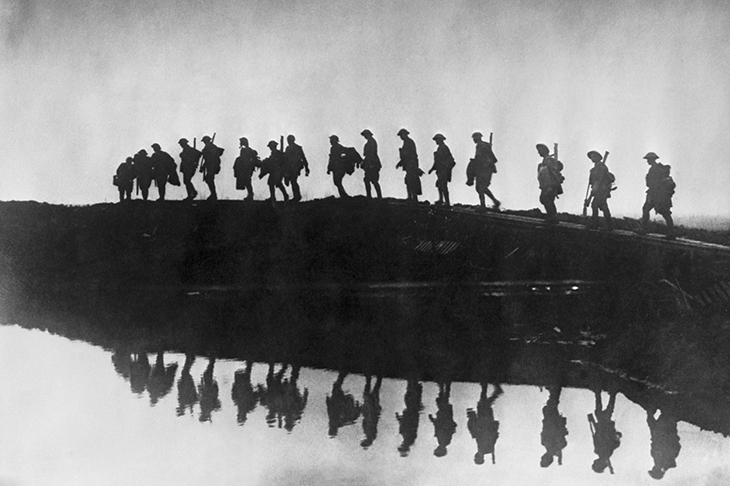My sister’s boyfriend is a solitary man and easily overwhelmed by another’s presence. On his rare visits he flits in and flits out again. On this occasion he was making his usual dash for the door when he saw me, remembered something, and handed me two battered old pocket diaries in that offhand, embarrassed way of his. ‘You’re interested in the first world war. I thought you might want to have these,’ he said. ‘If you can make any sense of them, good luck.’ I opened one and saw his surname, Smith, inscribed between the words ‘Gunner’ and ‘248 Siege Battery, Royal Garrison Artillery’. The diary was for 1917. The other one was for 1918. ‘Your grandfather?’ He nodded. I expressed surprise that he would want to give away his grandfather’s war diaries. A wave of the hand dismissed the idea of family sentiment as an absurdity and he was gone.
The 1918 diary still has the little metal-tipped pencil stub in the spine sleeve. Both diaries are completed. The pencil handwriting is tiny, faded, often wild. A few days later, I found an old magnifying glass and began the task of transcribing them into my own barely decipherable hand.
New Year’s Day 1917 finds Gunner Smith at Codford camp on Salisbury Plain. He has the measles and is confined in isolation in the harness room. Through January he limits himself to a single daily word or phrase such as ‘fatigues’, ‘snowing’, ‘firing’, ‘route march’, ‘shocking weather’ and ‘fed up’. On Friday, 15 February, his 248 Battery sails from Southampton to Le Havre and after that there isn’t enough space on the page for everything he wants to say.
On the 22 March, he marches 15 miles in full kit, then another three miles through trenches with mud up to his thighs to the battery position at St Eloi, south of Ypres. He digs in and humps and stacks shells for five days. ‘Shells dropping all around,’ he says. He is cold, wet, frightened, hungry, miserable. ‘What a life,’ he says. ‘I don’t know how we stick it.’ The only light relief is a dogfight in the sky above, after which the losing aeroplane crashes down in flames close to the position. ‘Pilot killed. Very exciting,’ he says.
But if my sister’s latest boyfriend’s grandfather thinks this is bad, he ain’t seen nothing yet, because 248 Battery arrived at the front line just in time to take part in the battle of St Eloi Craters, which commences on the 27th at 4.15 a.m. with the simultaneous detonation of 73,400lb of ammonal in six mines placed beneath the enemy front line. There must have been a racket going on because he either doesn’t hear it or thinks it too insignificant to remark on. ‘On parade at 2 o’clock. Two shells on the cookhouse, two outside the dugout. In action at 4 a.m. Finished at 5 p.m. Going for water at 6 p.m., a shell burst killed Abramson and Fairhurst and wounded three. Narrow escape.’
Still banging away on the 31st, he writes: ‘Still very cold. Raining terrible. Hard work. Rotten. Battery fed up. Hope John Bull is right. We are sending over lots of shells. I don’t know how ever Jerry stands it. Went into action at nine o’clock, fired all day till midnight, two or three have gone deaf through it. It started to rain at 2 o’clock. I’ve never felt so wet or as miserable. My word it makes you think of home.’ There was no pibble pabble in Pompey’s camp, says Shakespeare, but there was plenty in Gunner Smith’s.
Unfortunately, the battle of St Eloi Craters is a piece of cake, by the sound of it, compared to the Battle of Arras. Gunner Smith goes straight from the one battle to the other. ‘What sights we see,’ he writes on 20 April. ‘Dead soldiers all over. Trenches blown to bits. Terrible this was. Bought a lot of tea and sugar. Muck up to my knees.’
He fires his gun at the Germans around Arras continuously until the middle of May. ‘Windy at times,’ he admits. That battle ended, 248 Battery moves north again to a position close to Mount Kemmel, then from there to Ypres just in time for the terrible Third Battle of Ypres, which begins on 31 July. His gun is positioned at ‘Hellfire Corner’. ‘What horrible sights we have seen these last few days,’ he says on 4 August. ‘Makes you think of home very much.’ The poor man! Just when he thinks the war can’t get any worse he is moved to Hellfire Corner and Third Ypres!
‘You should read it. It’s amazing,’ I said to my sister’s latest boyfriend the next time he passed me in the hall on his way out. His despairing shrug, however, suggested that though he seriously envied my naivety, nothing but nothing could amaze him any more.







Comments